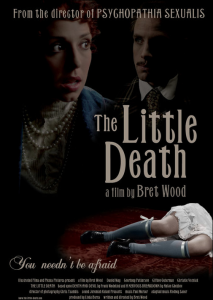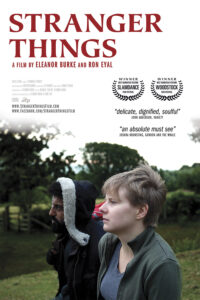The Atlanta Film Festival continued yesterday, May 3, 2011, without incident. The traumatic events of Sunday night are now in the rearview. But many questions remain unanswered.
I tracked down several filmmakers including one of the producers of the fine short film “Bayou Black” that ironically screened prior to “Snow on tha Bluff” on Sunday night. That interview will be up soon.
 The highlight of the festival for me so far has to be Bret Wood’s “The Little Death.” Wood, a filmmaker committed to making movies in his hometown of Atlanta, joined me to talk about the film. Like his 2006 film “Psychopathia Sexualis,” “The Little Death” is a period drama that explores sexuality in a mature and intelligent way. The set-bound film is superior to “Sexualis” in many ways and will be much more accessible exposing the filmmaker’s unique perspective to a broader audience. Writer/director Wood, a detailed perfectionist, crafts his tale by borrowing from the works of Frank Wedekind (“Death and Devil”) and Anton Chekhov (“A Nervous Breakdown”). And the result is utterly enchanting.
The highlight of the festival for me so far has to be Bret Wood’s “The Little Death.” Wood, a filmmaker committed to making movies in his hometown of Atlanta, joined me to talk about the film. Like his 2006 film “Psychopathia Sexualis,” “The Little Death” is a period drama that explores sexuality in a mature and intelligent way. The set-bound film is superior to “Sexualis” in many ways and will be much more accessible exposing the filmmaker’s unique perspective to a broader audience. Writer/director Wood, a detailed perfectionist, crafts his tale by borrowing from the works of Frank Wedekind (“Death and Devil”) and Anton Chekhov (“A Nervous Breakdown”). And the result is utterly enchanting.
Essentially a lushly shot stage play that is impeccably acted, Wood’s “The Little Death” surprised me with its literate approach to the controversial subject of sex for sale. While the period is the turn-of-the-century, the values and conflicts explored are very much relevant today. Three young men enter a brothel to partake in the spoils. One of the young men is troubled by the activity and questions whether they should be there at all. His naivety soon turns to crude curiosity when one of the more nubile prostitutes plays innocent and spars with him intellectually. Meanwhile a strong-willed woman enters the brothel looking to save one of the women and is confronted by the equally strong-willed male owner. The two engage in some pointed and often tension filled banter that eventually takes on a flirty tone.
Focusing on the technical side of things, “The Little Death” was shot on a Panasonic HVX200, which in this day of DSLR filmmaking seems a bit antiquated. And yet, the look of the film is impressive. Initially, I was thrown by the colors, which bathes its characters in many dark shades. A short film called “The Strange Ones” played right before “Death” was shot almost entirely outside which made it much brighter and sharper looking. But the coupling of the two films was a smart choice by the festival because both films shared in troubling subject matter. And film geeks should take heart that the camera used to shoot “Death” can be purchased used for less than $3000.
In my interview that I’ll cut and post in the next week, Wood talks about his next project being set in modern times and whether he’d like to move to Hollywood. While he may have LA dreams, he’s happy pursuing them in Atlanta. But if he keeps making movies as carefully constructed as “The Little Death,” Atlanta might have a hard time holding onto him.
 Michael Dunaway spoke with Ron Eyal, one of the co-directors of “Stranger Things.” Dunaway really liked the film and I shot the interview in the lobby, which was great fun as crowds walked around us. On of the stars of “Things” is Adeel Akhtar, who was seen in last year’s “Four Lions” that is now available on Netflix streaming. “Stranger Things” won the best narrative feature award at the Slamdance and Woodstock film festivals this year. Watch for the interview coming soon.
Michael Dunaway spoke with Ron Eyal, one of the co-directors of “Stranger Things.” Dunaway really liked the film and I shot the interview in the lobby, which was great fun as crowds walked around us. On of the stars of “Things” is Adeel Akhtar, who was seen in last year’s “Four Lions” that is now available on Netflix streaming. “Stranger Things” won the best narrative feature award at the Slamdance and Woodstock film festivals this year. Watch for the interview coming soon.
The Atlanta Film Festival continues through Saturday, May 7, 2011. For more information visit the festival website: http://www.atlantafilmfestival.com/
Note that the main page image from “The Little Death” was shot by Ted Westby.

